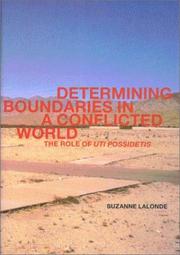| Listing 1 - 2 of 2 |
Sort by
|
Book
ISBN: 1316455726 1316456684 131645620X 1316458601 1316339009 1107117984 1107542227 1316452360 9781316339008 9781316458600 9781107542228 9781316456682 9781107117983 9781107542228 Year: 2015 Publisher: Cambrdige, United Kingdom
Abstract | Keywords | Export | Availability | Bookmark
 Loading...
Loading...Choose an application
- Reference Manager
- EndNote
- RefWorks (Direct export to RefWorks)
This book challenges a central assumption of the international law of territory. The author argues that, contrary to the finding in the Frontier Dispute, uti possidetis is not a general principle of law enjoining states to preserve pre-existing boundaries on state succession. The book demonstrates that African state practice gave rise to customary rules of intangibility of inherited frontiers and respecting the territorial status quo that, respectively, regulate sovereign territory transfer in Africa on independence and beyond. It explains that those rules changed international law as it relates to Africa in many aspects, including the creation of norms of African jus cogens prohibiting secession and the redrawing of boundaries. The book examines in depth the phenomenon of secession in Africa, exploring extensive state practice. Finally, it advances a daring argument for a right to egalitarian self-determination, addressing domination in multi-ethnic states, to serve as an exception to the African rule against secession.
Customary law, International --- Uti possidetis (International law) --- Boundaries. --- State succession. --- States, Creation of --- States, Succession of --- Succession of states --- International law --- Dismemberment of nations --- Recognition (International law) --- Borders (Geography) --- Boundary lines --- Frontiers --- Geographical boundaries --- International boundaries --- Lines, Boundary --- Natural boundaries --- Perimeters (Boundaries) --- Political boundaries --- Borderlands --- Territory, National --- Boundaries --- Treaties --- Customary international law --- International customary law --- Jus cogens (International law) --- Africa --- Eastern Hemisphere

ISBN: 1282860674 9786612860676 0773570497 9780773570498 077352424X 9780773524248 Year: 2002 Publisher: Montréal, Que. McGill-Queen's University Press
Abstract | Keywords | Export | Availability | Bookmark
 Loading...
Loading...Choose an application
- Reference Manager
- EndNote
- RefWorks (Direct export to RefWorks)
"In 1992, when Yugoslavia was on the point of disintegration, the Badinter Commission recommended that the issue of its boundaries be resolved according to the principle of uti possidetis: the internal boundaries dividing the former Yugoslav Republics should automatically become the international boundaries of the new states." "In Determining Boundaries in a Conflicted World Suzanne Lalonde examines the origins of the uti possidetis principle, its evolution and colonial roots as well as more recent applications, to determine whether it merits the overriding importance now attributed to it. She argues that nothing justifies conferring such a binding status on the principle and that the uti possidetis applied in Yugoslavia was an entirely new version that can derive no legitimacy from colonial precedents. While the doctrine may have considerably utility in some cases, it is only one principle among many that must be considered if future disputes are to be resolved so as to promote long term peace and stability. Lalonde sounds a cautionary note, showing that the idea that uti possidetis provides a one-size-fits-all, legally incontestable solution to all territorial disputes is an illusion."--Jacket
Uti possidetis (International law) --- Boundary disputes. --- Border disputes --- Disputes, Boundary --- Territorial boundary disputes --- Boundaries --- International law --- Treaties --- Québec (Province) --- Kempek (Province) --- Canada East --- Province de Québec --- Province of Québec --- Provinsie van Quebec --- Kvebek (Province) --- Правінцыя Квебек --- Pravintsyi︠a︡ Kvebek --- Квебек (Province) --- Κεμπέκ (Province) --- Kebekio (Province) --- Kebek (Province) --- 퀘벡 주 --- Kʻwebek-ju --- Kʻwebek (Province) --- Kupaik (Province) --- קוויבק (Province) --- Ḳṿibeḳ (Province) --- Quebecum (Province) --- Kvebeka (Province) --- Kvebekas (Province) --- Kébeki (Province) --- Кэбэк (Province) --- ケベック州 --- Kebekku-shū --- Kebekkushū --- ケベック (Province) --- Kebekku (Province) --- Provincia Québec --- קוויבעק (Province) --- Kvebeks (Province) --- 魁北克 (Province) --- Kuibeike (Province) --- Kui bei ke (Province) --- Lower Canada --- Boundaries. --- Quebec (Province)
| Listing 1 - 2 of 2 |
Sort by
|

 Search
Search Feedback
Feedback About UniCat
About UniCat  Help
Help News
News